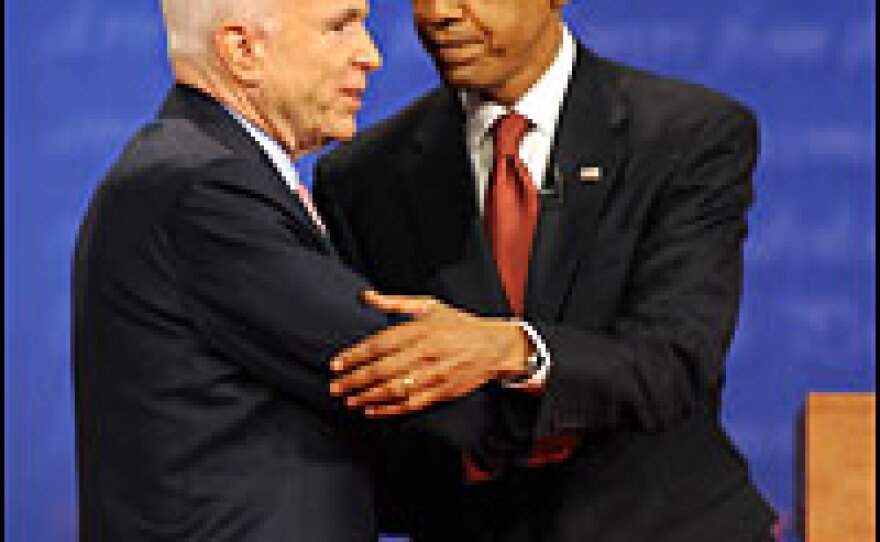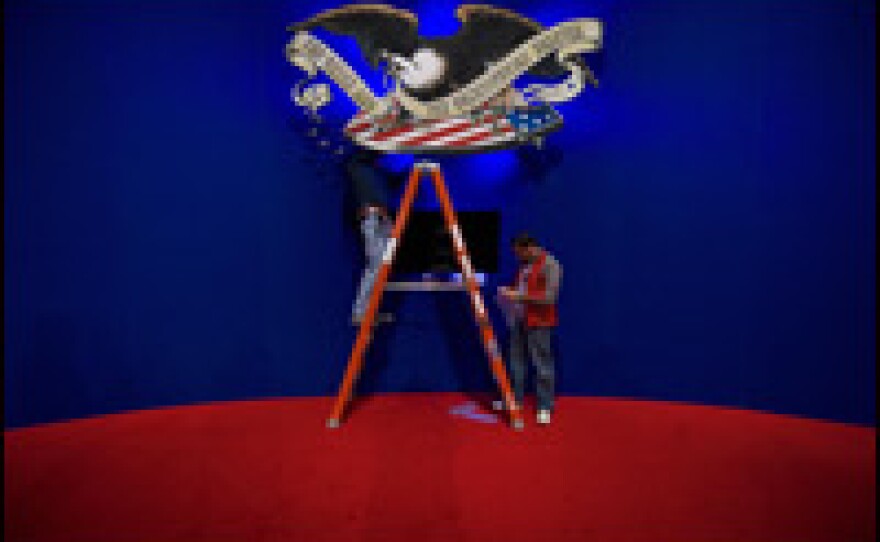

Sens. John McCain and Barack Obama go into their second presidential debate Tuesday night with a lot to live up to.
They need to reclaim the spotlight from their vice presidential running mates and sharpen the distinctions between them. And they'll have to do it in a format that will require different debating skills.
In their first debate, the two men at the top of the Republican and Democratic tickets drew more than 50 million viewers. But that audience paled in comparison to the more than 70 million people who tuned in to watch the face-off between their running mates, Democratic Sen. Joe Biden of Delaware and Republican Gov. Sarah Palin of Alaska. While those numbers were driven in part by curiosity about how Palin would perform, they drew attention from the main players and their policies.
In the earlier matchup, McCain sought to portray Obama as untested and inexperienced. Obama tried to show McCain as a follower of President Bush who would simply continue the same policies. Although the debate was billed as a discussion of foreign policy and national security — generally considered to be McCain's strong points — those issues were inevitably overshadowed by the financial crisis, a topic where national polls show Obama has an advantage.
Emphasis On The Economy
Unlike the first debate, in which the candidates — despite the urging of moderator Jim Lehrer — seemed to address the cameras more than they did each other, Tuesday night's debate will follow a town-hall format.
Lehrer held tight control of the format, asking the questions and giving each candidate two minutes to answer, followed by a five-minute discussion. The candidates rarely engaged each other. Critics faulted McCain for seeming to ignore his rival's presence altogether at times. Others chastised Obama for seeming too deferential, prefacing several answers by saying that his rival was "absolutely right."
It wasn't exactly high praise, because the Democrat qualified each of those compliments by suggesting that McCain was wrong on the larger issues. But in hindsight, it gave the McCain camp fodder for a campaign ad that made it seem as though Obama had conceded on subject after subject.
By contrast, in Tuesday night's debate at Belmont University in Nashville, the candidates will answer questions posed by members of the audience or sent via the Internet. For that reason, it's likely to focus even more intensely on voters' economic concerns.
Look for the candidates to spar over what measures they would take to support Main Street after the Wall Street bailout. They'll probably also have to address government spending in the face of an ever-yawning deficit.
McCain said in the last debate that he would consider freezing spending for everything but defense, veterans' affairs and entitlement programs. Obama said he believes the economy will need more spending on infrastructure, and that programs such as earlier childhood education are currently underfunded.
Regardless of the questions asked, both candidates will likely bring up their tax plans. Obama likes to link McCain's tax-cut plan to the Bush administration's tax breaks for wealthier Americans. Obama says his plan closes tax loopholes for big corporations but reduces taxes for the 95 percent of Americans who make less than $250,000 per year. McCain says his proposals will create jobs, but his way of doing that involves cutting corporate income taxes, which would mainly benefit better-off people who own stocks.
Faster-Paced Exchange?
As moderator, NBC newsman Tom Brokaw will give each candidate two minutes to respond to each question, followed by a minute for further discussion.
The format may not allow the same in-depth answers as in the first debate, but it could make for a wider-ranging discussion. The vice presidential debate was praised for being fast moving, with Palin and Biden responding under similar time constraints.
McCain favors the more casual town-hall format, where he tends to perform better than in his stump speeches. His campaign called on Obama to hold 10 joint town-hall meetings over the summer, but Obama declined, saying three debates would be enough.
The audience for Tuesday night's debate will include 80 to 120 voters from the Nashville area, identified as "undecided" by surveyors from the Gallup Organization.
Changed Electoral Map
In the less than two weeks since McCain and Obama had their first debate, the electoral map has shifted, largely in Obama's favor. On Thursday, just before the vice presidential debate, McCain's campaign decided to cut potential losses in Michigan, dropping TV ads and moving staff to more competitive states.
The economic crisis has strengthened Obama in some battleground states, including Colorado, Missouri and Florida — states that George W. Bush won in 2004. The latest Fox News/Rasmussen Reports poll shows Obama holding on to a narrow lead in Virginia, and McCain staying slightly ahead in Ohio.
Some McCain staffers who were pulled off the effort in Michigan may be sent to shore up the campaign's efforts in Pennsylvania, Wisconsin, Minnesota and New Hampshire.
Copyright 2022 NPR. To see more, visit https://www.npr.org. 9(MDAzMjM2NDYzMDEyMzc1Njk5NjAxNzY3OQ001))





